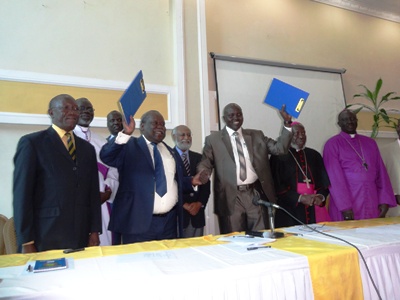Report casts doubt on neutrality of S. Sudan Cobra faction
April 5, 2015 (BOR) – As the Greater Pibor Area Administration (GPAA) enters the second year since its creation, queries are being raised on the neutrality of the South Sudan Democratic Forces (SSDF)-Cobra Faction, after it signed an agreement with government last year.

A recent report by Human Security Baseline Assessment (HSBA) indicates the Cobra faction may not be as neutral as perceived despite a peace deal with government.
Finding a compromise on security arrangements and integration of the Cobra faction into the security sector was one of the crucial aspects of peace talks held in Ethiopia.
When Yau Yau accepted a presidential amnesty in 2011, when his militias were sent to training centres in Eastern Equatoria and Western Bahr el Ghazal states.
In the 2014 agreement with the government, it was clearly stated that the integration of the Cobra factions into the national army and other security service, as well as its training and deployment, will occur within the borders of GPAA, the report found.
“This was a strategic plan by Yau Yau to given political leverage over his troops special over the transitional period that will precede the effective implementation of the agreement, including the release of the promised development fund for GPAA,” the report said.
Reintegration is actually a boon for Yau Yau. During the rebellion, he was able to enlarge his constituency mainly thanks to his access to arms, which he redistributed as incentives to join the cobra faction.
The biggest question in everyone minds was whether the Cobra faction forces would not join government forces against the rebels.
“In several occasions prior to signing of the peace deal, Cobra faction affirmed its intention not to take part in South Sudan government, opposition’s forces conflict. Yet nowhere in the agreement where it was mentioned that Yau Yau’s men would not participate in military action against Machar’s forces,” the HSBA report said.
The same report indicated that Riek Machar met in person with Cobra faction head of delegation, Khalid Boutros, after the latter signed GPAA agreement as the head of cobra faction. Machar warned that by signing the agreement he had taken sides.
The Cobra faction obtained important political gains in the peace negotiation with the government that led to the formation of the autonomous administration (GPAA), which Yau Yau was fighting for. This gain on paper is yet to be implemented in reality.
South Sudan army chief of staff, Paul Malong allegedly made an open request for Yau Yau to recruit and conduct specific operations in Uror, Waat and Akobo, a decision the latter reportedly rejected.
According to the report, the South Sudanese government might be using both carrots and sticks by withholding funds for the GPAA as agreed upon in the peace deal and pushing the Cobra faction to fight the rebels.
In Gumuruk, integration began on 18 August, but was placed on temporary on hold almost immediately, reportedly due to unclear regulations over the integration of the senior officers.
The Cobra faction screened out 247 child soldiers in Gumuruk town in January and 300 more in February as part of the plan to release a total of between 2,000 and 3,000 young boys by the end of the integration period.
In the report, Jonglei state government and the people of Bor, the former governor of Jonglei state, Kuol Manyang Juuk, currently the minister of defence and veteran affairs, are described as “spoilers” of autonomous administration in the Greater Pibor.
Former Pibor commissioner Joshua Konyi was named among the main antagonists of Yau Yau’s administration.
(ST)
